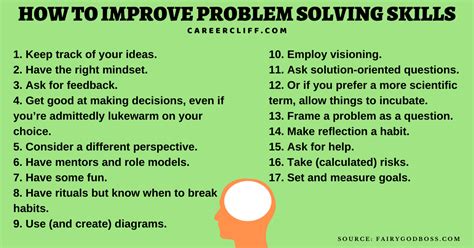Problem Solving Skills: What Are They And How To Improve

Problem-solving skills are essential in today’s world, both in personal and professional settings. Whether you are dealing with a complex issue at work or trying to solve a personal problem, having strong problem-solving skills can help you find a solution and move forward.
What are Problem-Solving Skills?
Problem-solving skills refer to the ability to identify, analyze, and solve problems in a systematic and effective way. These skills involve various cognitive processes such as critical thinking, creativity, and decision-making that allow individuals to find solutions to complex and ambiguous problems.
Why Are Problem-Solving Skills Important?
Problem-solving skills are essential in both personal and professional settings. They can help you:
How to Improve Problem-Solving Skills
Improving your problem-solving skills can help you become more successful in your personal and professional life. Here are some ways to enhance your problem-solving skills:
1. Identify the Problem
To solve a problem, you must first identify it. Try to clearly define the problem and its underlying causes. This will help you understand the problem better and find a suitable solution.
2. Gather Information
Collect relevant data and information related to the problem. This can help you analyze the problem objectively and make informed decisions.
3. Analyze the Problem
Use critical thinking skills to analyze the problem and its causes. This can help you identify potential solutions and their potential outcomes.
4. Develop Solutions
Brainstorm potential solutions to the problem. Evaluate each solution based on its feasibility, effectiveness, and potential outcomes.
5. Implement the Solution
Choose the best solution and implement it. Monitor the progress and make necessary adjustments if needed.
6. Evaluate the Outcome
Evaluate the outcome of the solution. Reflect on what worked well and what could be improved for future problem-solving situations.
Tips for Improving Problem-Solving Skills
Here are some additional tips to help you improve your problem-solving skills:
Conclusion
Problem-solving skills are essential for success in both personal and professional settings. By identifying the problem, gathering information, analyzing the problem, developing solutions, implementing the solution, and evaluating the outcome, you can improve your problem-solving skills. Remember to practice problem-solving in different situations, learn from past experiences, seek feedback from others, and continuously learn and develop new skills.
Frequently Asked Questions
Q: What are some common problem-solving techniques?
A: Some common problem-solving techniques include brainstorming, root cause analysis, SWOT analysis, and the five whys.
Q: How can I improve my critical thinking skills?
A: You can improve your critical thinking skills by asking questions, challenging assumptions, evaluating evidence, and considering multiple perspectives.
Q: Why is creativity important in problem-solving?
A: Creativity can help you generate new ideas and solutions to problems that may not have been considered before. It can also help you approach problems from different angles and find unique solutions.
